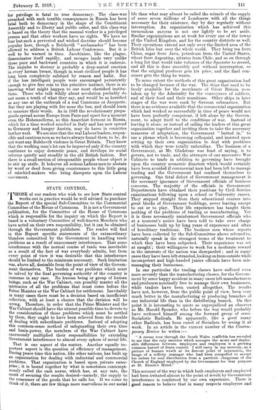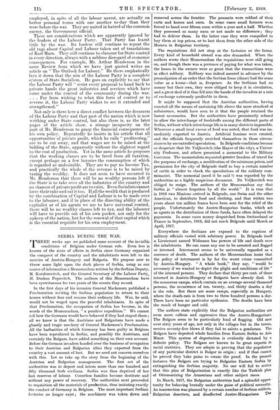STATE CONTROL.
THOSE of our readers who wish to see how State control works out in practice would be well advised to purchase the Report of the special Sub-Committee to the Commercial Committee of the House of Commons. It is not a Government publication, for the Committee of the House of Commons which is responsible for the inquiry on which the Report is based is a voluntary Committee of well-known Members who have acted on their own responsibility, but it can be obtained through the Government publishers. The reader will find in this Report specific statements of the extraordinary blunders committed by the Government in handling trade problems as a result of unnecessary interference. That some interference with the normal course of trade was inevitable as a result of the fact of war everybody admits, but from every point of view it was desirable that this interference should be limited to the minimum necessary. Such limitation was, above all, desirable from the point of view of the Govern- ment themselves. The burden of war problems which must be solved by the final governing authority of the country is immense in any case. No human being or group of human beings, such as the War Cabinet, can possibly master all the intricacies of all the problems that must come before the Prime Minister or the War Cabinet for settlement. Inevitably in many cases there must be a. decision based on insufficient reflection, with at least a chance that the decision will be wrong. Therefore, in order that the Prime Minister and the War Cabinet should have the utmost possible time to devote to the consideration of those problems which must be settled by them, they ought to have been relieved from the trouble of dealing with subordinate problems. Instead of adopting this common-sense method of safeguarding their own time and brain-power, the members of the War Cabinet have enormously multiplied their responsibilities by extending Government interference to almost every sphere of social life.
That is one aspect of the matter. Another equally im- portant aspect is the question of efficiency of management. During peace time this nation, like other nations, has built up an organization for dealing with industrial and commercial problems. That organization is based upon private enter- prise ; it is bound together by what is sometimes contempt- uously called the cash nexus, which has, at any rate, the merit of securing the results desired—namely, the supply to the consumer of the goods that he calls for. If we come to think of it, there are few things more marvellous in our social life than what may almost be called the miracle of the supply of some seven millions of Londoners with all the things necessary for their existence, day by day regularly without interruption. An organization which has achieved this tremendous success is not one lightly to be set aside. Similar organizations are at work for every one of the towns of the United Kingdom, and for the country districts as well. Their operations extend not only over the limited area of the British Isles but over the whole world. They bring tea from China, sugar from Java, 'petroleum from the United States, wheat from Argentina, nitrates from Chile, and so on through a long list that would take volumes of the Spectator to record, and all this is done smoothly and without interruption, so that the original producer gets his price, and the final con- sumer gets the thing he wants.
To some extent the methods of this great organization had to be changed because of the war. The ships that used to be freely available for the merchants of Great Britain were taken up by the Admiralty for the conveyance of soldiers, and of their food and their munitions. Other ships in later stages of the war were sunk by German submarines. But there is no evidence available that the commercial organization which had worked so successfully in time of peace would not have been perfectly competent, if left alone by the Govern- ment, to adapt itself to the conditions of war. Instead of leaving it alone, or instead of calling the leaders of this great organization together and inviting them to take the necessary measures of adaptation, the Government " butted in," to use a phrase which is becoming colloquial, and insisted upon setting up their own organization to deal with problems with which they were totally unfamiliar. The business of a Government, as Mr. Gladstone was fond of saying, is to govern, not to trade, and the attempts of our successive War Cabinets to trade in addition to governing have brought upon the country economic disasters which -would certainly have been avoided if commercial men had been left to manage trading and the Government had confined themselves to governing. One fatal defect of Government management is the necessary ignorance of Government officials of business concerns. The majority of the officials in Government Departments have obtained their positions by Civil Service examinations following upon a school or University career. They stepped straight from their educational courses into great blocks of Government -buildings, never leaving except to eat or to play. Their life experience has taught them nothing of the problems of trading or manufacturing. Yet it is these necessarily uninformed Government officials who at a moment's notice have been told to take over charge of businesses built up by long years of experience and often of hereditary traditions. The business men whose reports have been collected by the Sub-Committee above referred to, naturally speak in the strongest terms of the treatment to which they have been subjected. Their experience was set at naught ; their willingness to work for a moderate reward in the interests of the nation was disregarded ; and in many cases they have been left stranded, looking on from outside while incompetent and high-handed junior officials have been mis- managing their businesses.
In one particular the trading classes have suffered even more severely than the manufacturing classes, for the Govern- ment by some happy accident in many cases left manufacturers and producers nominally free to manage their own businesses, while traders have been ousted altogether. The results have not, however, from the public point 9f view. been very much better in the manufacturing or producing branches of our industrial life than in the distributing branch. On this point it is interesting to quote so unprejudiced an observer as Mr. Harold Spender, who before the war would probably have reckoned himself among the forward group of semi- Socialistic Radicals. He apparently, like a good many other Radicals, has been cured of Socialism by seeing it at work. In an article in the current number of the Contem- porary Review he writes :— " A recent tour through the South Wales coalfields has revealed to ins that the only emotion which assuages the acute and deplor- able differences between employers and employees is a growing common hatred of State control. I still carry in my memory, as a picture of human wrath at its fiercest point of expression, the image of a colliery manager who .had been compelled to accept his orders for coal distribution from a patriotic clergyman of the Church of England employed by the Government for that purpose at St. Ermin's Hotel.
This account of the way in which both employers and employed had been irritated almost to the point of revolt by Government interference is confirmed by our own experience. There is good reason to believe that in many respects employers and employed, in spite of all the labour unrest, are actually on better personal terms with one another to-day than they were before the war. They are united in hatred of the common enemy, the Government official. These are considerations which are apparently ignored by the leaders of the Labour Party. That Party has learnt little by the war. Its leaders still continue to repeat the old tags about Capital and Labour taken out of translations of Karl Marx. They still continue to clamour for State control in every direction, always with a sublime disregard of economic consequences. For example, Mr. Arthur Henderson in the same Review from which we have just quoted writes an article on " The Outlook for Labour." He there emphatically lays it down that the aim of the Labour Party is a complete system of State Socialism. He goes on explicitly to say that the Labour Party will " resist every proposal to hand back to private hands the great industries and services which have come under the control of the community during the war. . . . Far from wishing to relax this form of control or to reverse it, the Labour Party wishes to see it extended and strengthened."
Not only is there here a direct conflict between the dreamers of the Labour Party and that part of the nation which is now writhing under State control, but also there is, as the later pages of the article show, a strange incapacity on the part of Mr. Henderson to grasp the financial consequences of his own policy. Repeatedly he insists in his article that all opportunities of private profit, which he calls " profiteering," are to be cut away, and that wages are to be raised at the bidding of the State, apparently without the slightest regard to the cost of production. Yet in the same article he proposes that the working classes are to be freed from all taxation, except perhaps on a few luxuries the consumption of which is regarded as undesirable. They are to pay no Income Tax, and practically the whole of the revenue is to be raised by taxing the wealthy. It does not seem to have occurred to Mr. Henderson that there will be no wealthy persons left if the State is to take over all the industries of the country and no chances of private profit are to exist. Even Socialists cannot have their cake and eat it too. Hall the wealth that is produced by the combination of Capital and Labour is to be made over to the labourer, and if in place of the directing ability of the capitalist or of his agents we are to have universal control, there will be no wealthy classes left to tax, and the labourer will have to provide out of his own pocket, not only for the upkeep of the nation, but for the renewal of that capital which is the essential requisite for his own employment.



































 Previous page
Previous page